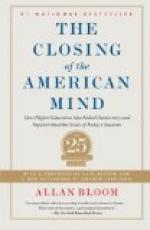Further, if education is to overcome the menaces and solve the dilemma of democracy, it must be carried beyond childhood and youth and outside the walls of academic institutions. The ever wider education of adult citizenship is indispensable to the progress and safety of democracy. It is one of the glaring illustrations of the inefficiency of our democracy that there are still communities where school boards build school houses with public money, open them five or six hours, five days in the week, and refuse to allow them to be opened any other hour of the day or night, for a civic forum, parents’ meeting, public lecture or other activity of adult education; and yet we call ourselves a practical people! Surely, in a democracy, the state is as vitally interested in the education of the adult citizen as of the child.
Herein is the significance of those various extensions of education, developing and spreading so widely to-day. University-extension and Chautauqua movements, civic forums, free lectures to the people by boards of education and public libraries, summer schools, night schools for adults—all are illustrations of this movement, so vital to the progress of democracy. Through these instrumentalities the popular ideal may be elevated, the public mind may be trained to more logical and earnest thought, citizenship may be made more serious and intelligent, and finally a most helpful influence may be exerted on the academic institutions themselves. It is an easily verifiable truth that any academic institution that builds around itself an enclosing scholastic wall, refuses to go outside and serve and learn in the larger world of humanity, in the long run inevitably dies of academic dry rot.
In the endeavor to solve the problem of democracy cannot we do more than we have done hitherto in cultivating reverence for moral leadership—the quality so much needed in democracy at the present hour? This may be achieved through many aspects of education, but especially through contact with noble souls in literature and history. History, above all, is the great opportunity, and, from this point of view, is it not necessary to rewrite our histories: instead of portraying solely statesmen and warriors, to fill them with lofty examples of leadership in all walks of life?
Women as well as men: for surely ideals of both should be fostered. A colleague, interested in this problem, recently took one of the most widely used text-books of American history, and counted the pages on which a woman was mentioned. Of the five hundred pages, there were four: not four pages devoted to women; but four mentioning a woman. What does it mean: that women have contributed less than one part in a hundred and five to the development of American life? Surely no one would think that. What, then, are the reasons for the discrepancy? There are several, but one may be mentioned: men have written the histories, and they have written chiefly of the two fields of action where men have been most important and women least, war and statesmanship. Surely, however, if American history is to reveal the American spirit, exercise the contagion of noble ideals and develop reverence for true moral leadership, it must present types of both manhood and womanhood in all fields of action and endeavor.




